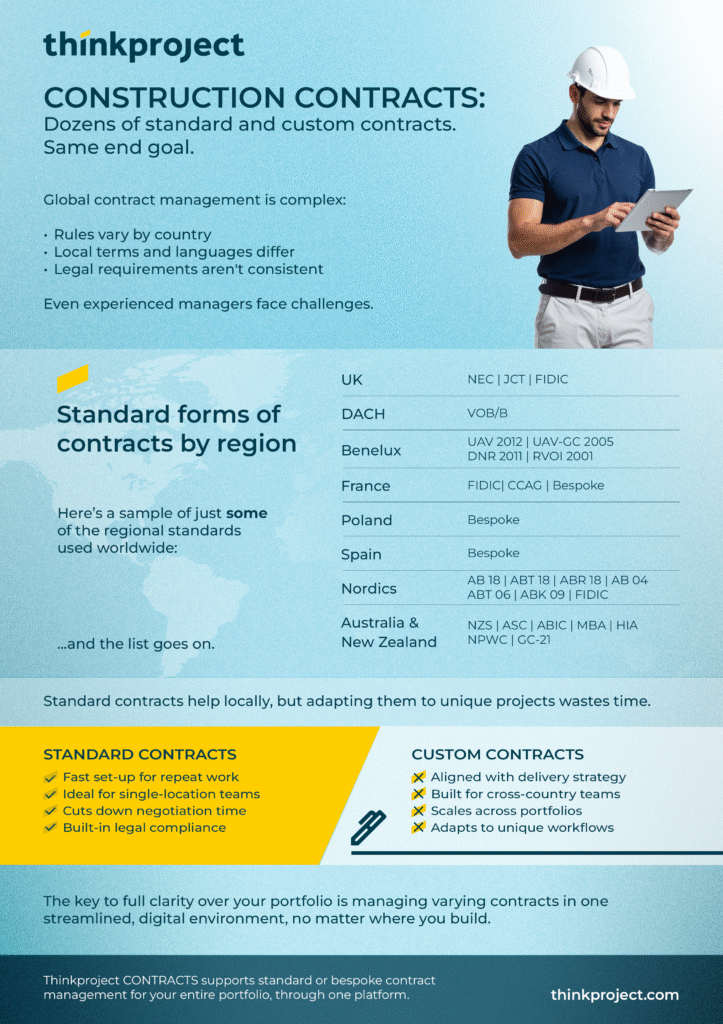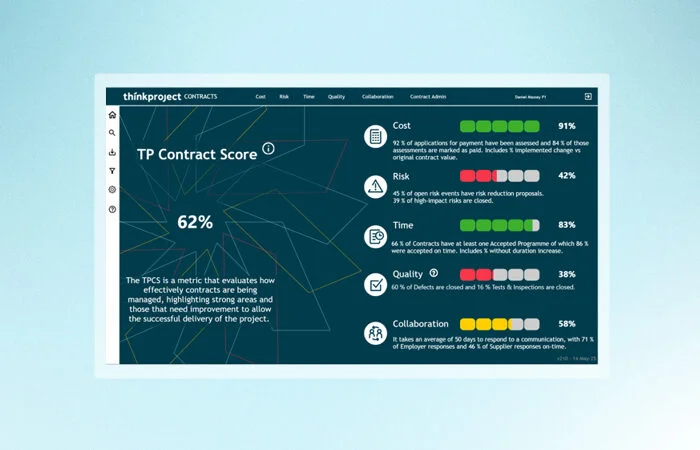
A guide to construction contract management: Importance, challenges & solutions
The construction industry involves numerous stakeholders, intricate processes, and significant financial investments. This complexity translates to the documentation and contracts that need to be put in place for any construction project. This complexity can only be navigated through effective construction contract management. This blog post explores the importance of contract management, highlighting common challenges, but also best practices.
The importance of contract management in construction
Construction contract management encompasses the complete lifecycle of contracts, including drafting, negotiation, execution, compliance, and closeout. It ensures that all parties understand their roles, responsibilities, and obligations. Successful contract management includes effective stakeholder coordination and creating thorough documentation.
Unfortunately, unless best practices and specialized tools are in place, construction contracts can be complex, often poorly drafted, and riddled with ambiguous amendments. This can lead to time-consuming and ineffective administration. At the same time, a construction project often uses several contracts at the same time.
For example, for a typical mid-size commercial building project, the number of contracts involved can be substantial. Such a project may include as many as:
- 1 main contractor agreement
- 20–40 subcontracts
- 5–10 consultant contracts
- 10–30 supplier contracts
- 5+ other legal or service contracts
While each project is different, it is not uncommon for such a project to involve between 40 and over 100 contracts.
But the challenge of managing multiple contracts for each project can be tackled by proper planning and management. Effective contract management can help ensure:
-
- Clear scope, roles, and responsibilities: Contract management is vital for clearly outlining the project’s scope, specifications and the distinct roles and responsibilities of every party involved, ensuring mutual understanding and accountability.
- Effective cost and time management: Effective contract management enables precise budget control, closely monitoring expenditures, and keeping the project on schedule by defining milestones and deadlines.
- Risk mitigation and dispute prevention: Contracts are crucial for allocating risks, ensuring legal compliance, and establishing clear dispute resolution mechanisms, thereby minimizing financial losses, avoiding legal issues and providing a framework for managing changes.

Types of construction contracts
The construction industry uses various standard and bespoke contract forms. Each of these use a different terminology, governance structures, and participant roles. While some contracts like the International Federation of Consulting Engineers (FIDIC) are recognized globally as engineering best practices, some forms of contracts are designed to be specific to their market.
Popular contracts in the UK
NEC
NEC (New Engineering Contract) contracts are a suite of standard forms primarily used in the UK, but also internationally for various construction and engineering projects. Their distinctive feature is a strong emphasis on collaboration, clear communication, and proactive risk management between parties.
Written in plain English, NEC contracts aim to foster a “spirit of mutual trust and co-operation” and prevent disputes through bespoke processes for potential issues. They provide flexibility through various pricing options and encourage active project management, making them a popular choice for complex infrastructure schemes where partnership is key.
FIDIC
FIDIC, or the International Federation of Consulting Engineers, publishes globally recognized, standardized contract forms for construction and civil engineering. These “FIDIC contracts” are pre-drafted templates aiming for a balanced allocation of risks and responsibilities between the Employer and Contractor.
Key characteristics include their international recognition, structured format with General (standard) and Particular (project-specific) Conditions, as well as a multi-tiered dispute resolution process. These contracts are known for their “Rainbow Suite,” with different “Books” tailored to various project types. For instance, the Red Book is for Employer-designed projects, the Yellow Book for Contractor design-build, and the Silver Book for high-risk EPC/Turnkey projects.
By standardizing practices and providing a common language, FIDIC contracts streamline international construction, fostering more predictable project outcomes.
JCT
Established in 1931, the JCT (Joint Contracts Tribunal) produces a suite of documents designed to clearly define the responsibilities, obligations and liabilities of all parties involved in a construction project.
These contracts cover a broad range of projects, from minor domestic works to large commercial developments, and allocate risk in a fair and recognizable way. Their standardized nature helps save time, minimize transaction costs, and provide a familiar framework for managing construction projects, including provisions for payment and dispute resolution.
Common challenges in construction contract management
Poor contract management in construction can lead to a cascade of negative consequences, from cost overruns due to unapproved changes and miscommunication, to project delays from missed milestones and inefficient processes.
It may also result in serious quality issues, payment disputes, strained relationships among project stakeholders, and even legal complications. Why can this happen? Contracts management comes with an array of challenges, due to the complexity associated with construction contracts:

-
- Ambiguity of contracts: Construction contracts are often long, highly detailed, and can contain complex legal and technical language. This complexity can lead to misinterpretations and ambiguities, which are ripe for disputes. Poorly defined scopes of work, incomplete specifications, and unclear definitions of terms may cause issues within a project.
- Managing change orders and variations: Changes are almost inevitable in construction projects due to unforeseen site conditions, design modifications, client requests, or material availability issues.
- Communication and Collaboration Breakdowns: Construction projects involve a multitude of parties (owners, architects, engineers, general contractors, subcontractors, suppliers, and regulators). Poor communication channels, untimely information sharing, and a lack of collaboration can lead to misunderstandings, errors and delays.
Benefits of using construction contract management software
In a world of digitalisation, the right software can help businesses improve their workflows and overcome common business challenges. In this case, implementing specialized construction contract management software can help overcome many of the challenges commonly associated with contracts management.
A contract management software can support with:
- Centralized document management: A contract management software acts as a single, secure hub for all contract-related documents. This eliminates scattered paperwork, ensures everyone has access to the latest versions and simplifies searching and sharing information.
- Streamlined workflows and automation: The software automates routine administrative tasks like creating contracts from templates, routing documents for approvals, and sending automated reminders for deadlines. This accelerates approval processes and reduces manual effort.
- Enhanced collaboration: The software allows for the right information and document version to reach the right people at the right time, minimizing delays and misunderstandings.
- Risk management and compliance: Mitigate risks by providing tools to track compliance with licenses, certifications, safety standards, and regulations. This also creates an audit trail for all contract activities, ensuring transparency and accountability.

How Thinkproject can help
Through its Contract Management, Thinkproject offers a professional, consistent approach to managing construction contracts. It combines industry knowledge and to simplify contract management and free professionals from unnecessary administrative burdens.
In addition to managing the most common types of contracts like FIDIC, JCT and NEC, Thinkproject also allows the management of custom or bespoke contracts – that is, the solution can support the management of all contract forms, adapting to the needs of all construction businesses.
Ready to improve your contract management process? Learn more about how Commercial & Contract Management works with Thinkproject or schedule a custom demo.






